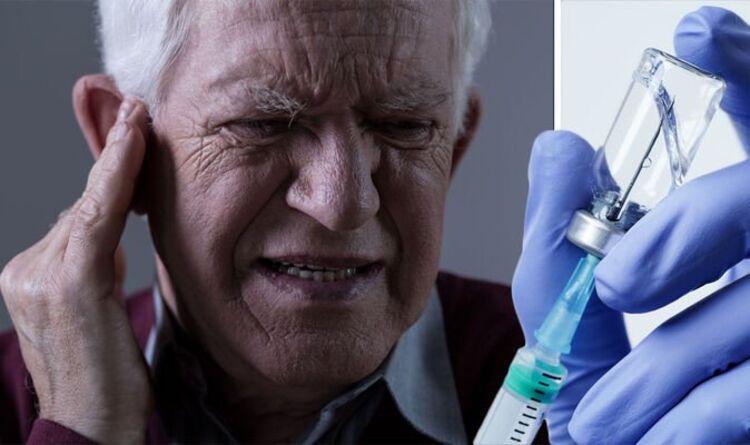Coronavirus vaccine: Is tinnitus a side effect of the jab? Study looks at reported link
Dr Amir Khan discusses 'variant proof' coronavirus vaccine
We use your sign-up to provide content in ways you’ve consented to and to improve our understanding of you. This may include adverts from us and 3rd parties based on our understanding. You can unsubscribe at any time. More info
The development of the COVID-19 vaccine has offered overwhelming respite to countries across the globe. But at times, adverse effects have raised questions. To date, the relationship between tinnitus and the coronavirus has remained inconclusive. According to recent data, however, more than 12,000 cases of the hearing ailment have been recorded after inoculation with a COVID-19 vaccine.
A recent review, published in the Annals of Medicine and Surgery, has shed light on the complex link between the COVID-19 vaccine and tinnitus.
To date, severe side effects associated with the vaccine have included myocarditis and thrombotic thrombocytopenia, noted the authors.
But Syed Hassan Ahmed, from the Dow University of Health Sciences, in Pakistan, and his colleagues noted: “More recently, some cases of tinnitus are reported post-vaccination.
“According to the Vaccine Adverse Events Reporting System (VAERS), 12,247 cases of coronavirus post-vaccination tinnitus have been reported till September 14, 2021.”
READ MORE: Fourth Covid booster jab is coming: Thousands told to book from TOMORROW

They continued: “Although the incidence of vaccine-associated tinnitus is rare, there is an overwhelming requirement to discern the precise pathophysiology and clinical management as a better understanding of adverse events might be helpful in encountering vaccines and hence fostering the COVID-19 global vaccination program.
“The benefits of SARS-CoV-2 vaccine in reducing hospitalisation and deaths continually outweighs the rare ramifications despite the incidence of adverse events.”
The authors stressed while hypotheses have attempted to clarify the nature of the relationship between tinnitus and the vaccine, the precise mechanisms remain undetermined.
They did however note that the characteristics of a tinnitus diagnosis, including whether it is intermittent, continuous, pulsatile or non-pulsatile, could offer key indications as to which underlying pathologies are at play.
The scientists also noted that two of the reported cases of vaccine-associated tinnitus had a medical history of otological conditions.
This finding, noted the team, suggests genetic predisposition could play a significant role in determining who’s at risk.
They went on to hypothesise that a possible cause for tinnitus could be reactivity between anti-spike SARS-CoV-2 antibodies and otological antigens.
As antibodies interact with the antigens along the auditory pathway, they could trigger an inflammatory reaction, explained the authors.

According to WebMD, the symptoms of the condition include noise in the ears, such as ringing, roaring, buzzing, hissing or whistling.
Most often, this is only heard by the person who has tinnitus, and the noise could be either intermittent or continuous.
The Mayo Clinic lists ear infections, ear canal blockage and head or neck injuries as possible causes of the condition.
But although the condition has many known causes, most cases stem from hearing loss – which causes the tiny hairs inside the ear to “leak” random electrical impulses to the brain.

Owing to the clear association between hearing impairment and tinnitus, the authors said audiology should be performed on patients to decide treatment.
Finally, stress and anxiety were identified as two other plausible risk factors for the development of tinnitus.
The research added that vaccine-related anxiety and the potential cause of tinnitus post-inoculation should be explored.
The team concluded their report with the following statement: “Despite the incidence of adverse events, the benefits of the SARS-CoV-2 vaccine in reducing hospitalisation and deaths continue to outweigh the rare ramifications.”
Source: Read Full Article
